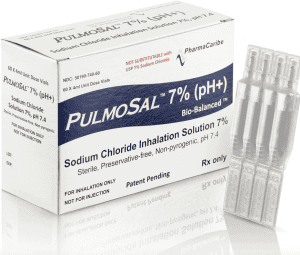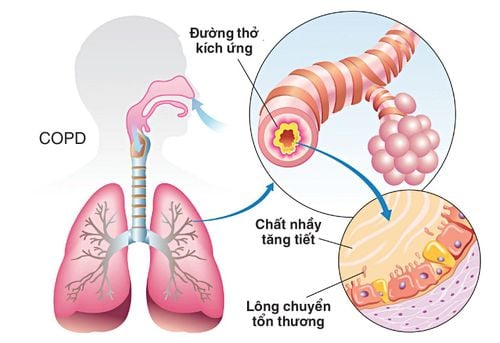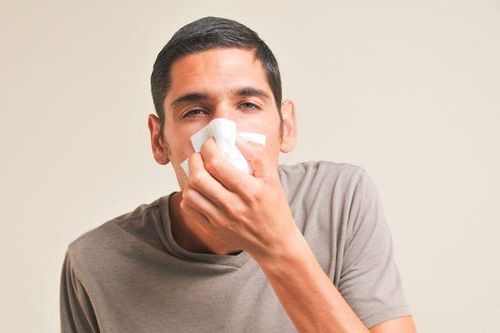This is an automatically translated article.
Mucus protects your respiratory system by lubricating and filtering inhaled air. Mucus is made by the mucous membranes from your nose to your lungs. Every time you breathe in allergens, bacteria, viruses, dust, and other debris that stick to your mucus, they are then cleared out of your airways. Sometimes, your body can make too much mucus, causing you to constantly get rid of it by coughing, sneezing,...
1. Causes of mucus formation in your chest
Your body naturally produces mucus every day and the presence of mucus is not necessarily a sign of anything out of the ordinary. Mucus, also known as phlegm when it's made by your respiratory system, includes tissues in your nose, mouth, throat, and lungs. Mucus helps protect you from infection.
Your body produces about a liter of mucus per day. But too much mucus, especially in somewhere like your lungs, can be uncomfortable and could be a sign of a health problem that needs to be treated.
There are a number of health conditions that can trigger excess mucus production, such as:
Acid Reflux: If you have acid reflux, the acid in your stomach moves up your esophagus to your throat. This can lead to throat irritation and postnasal drip down the throat, along with chest congestion. Allergies: Allergies can cause a wide range of symptoms, from itchy nose and sneezing to stuffy nose, chest tightness and coughing. There is also a chance of a more typical lung-related reaction if you are allergic to something in the air, such as pollen or dust mites. The respiratory system then produces a large amount of mucus to flush out the allergen, but often produces more mucus than necessary. Asthma: Along with other symptoms of asthma such as shortness of breath and chest tightness, the patient can also cause you to cough up phlegm. This could be a sign that your airways are inflamed, but a small amount of white or clear mucus is not a cause for concern. Bacterial or viral infections: Infections like the flu, acute bronchitis, and pneumonia can cause your airways to secrete extra mucus, and you'll often have a cough to clear the phlegm. Sputum can be green or yellow, depending on the cause. The novel coronavirus that causes the COVID-19 pandemic does not usually cause mucus in the chest. But complications from the virus can include pneumonia, which is associated with chest congestion. Chronic Obstructive Pulmonary Disease (COPD): COPD includes a number of lung diseases that can make breathing difficult, including chronic bronchitis and emphysema. Chronic bronchitis is an inflammation of the bronchial tubes and causes more mucus to be produced than usual. Chronic obstructive pulmonary disease makes it harder for your lungs to work. It is usually caused by long-term exposure to things that irritate the lungs, such as cigarette smoke. However, people with asthma can also develop it. Cystic fibrosis: This is an inherited disease that leads to the formation of thick mucus in the lungs and other organs. It can lead to a decline in lung function as people age. Cystic fibrosis (CF) tests can be done in infants, and up to 75% of people with CF are diagnosed by age 2 years. A parent can pass on the CF gene even if they don't themselves have the disease, and about 1,000 new cases of cystic fibrosis are diagnosed each year in the US.

Viêm phế quản mãn tính là tình trạng viêm ống phế quản và gây tiết nhiều chất nhầy hơn bình thường
In addition to the above medical causes, excess mucus production can also be caused by certain lifestyle and environmental factors, such as:
A dry indoor environment; Drink less water and other fluids; Drinking a lot of alcohol, tea, coffee can lead to dehydration; Certain medications; Smoke.
2. What to do to reduce mucus in the chest?
If overproduction of mucus becomes frequent and bothersome, consider seeing your doctor for a complete diagnosis and treatment plan. Your doctor may recommend certain medications such as:
Over-the-counter (OTC) medications: An expectorant such as guaifenesin (Mucinex, Robitussin) can thin and loosen mucus so it clears the throat and chest. yours. Prescription medications: mucus-thinning medications such as hypertonic saline (Nebusal) and dornase alfa (Pulmozyme) are mucus thinners that you'll breathe in through a nebulizer. If your excess mucus is caused by a bacterial infection, your doctor will most likely prescribe an antibiotic for you. However, it is not always necessary to use medication to treat excess mucus in the chest. Your doctor can also suggest some self-care steps you can take to help reduce mucus such as:
Gargle with warm salt water: This home treatment can help clear mucus from the back of your throat, and it can also help kill germs. Humidify the air: Moisture in the air can help thin your mucus. You can humidify the air in your room in the following ways: Using a humidifier: A cool mist humidifier is also a useful option for you. They are generally preferred in warmer climates where steam may not be the ideal choice. You may find it helpful to use a humidifier at night and keep it near your bed. This can help relieve a stuffy nose while you're sleeping so you can sleep better throughout the night. Make sure to close bedroom doors and windows so moisture doesn't escape. Steam can also help loosen mucus in your chest and clear up congestion in your chest. Depending on your needs, you can choose a steam generator or a humidifier at home. There are several ways to make your own steam generator, including: Allow your bathroom to become a sauna by: Let the water run until it starts to evaporate in the bathroom; Use bowls and towels... Drink enough water: Drinking plenty of water may sound cliché, but you can hear this advice so often because it really works. Fluids help thin mucus. In particular, warm water can help clear mucus in your chest and nose. This can relieve congestion, giving you a comfortable break. You may want to sip a cup of warm water, or a glass of warm apple juice or a bowl of chicken soup, etc. But you should not drink things that can make you dehydrated like coffee and alcohol. Elevate your head: Lying flat can make you feel like mucus is building up in your throat. You will find it more comfortable to raise your head while lying down. Avoid decongestants: Although decongestants dry up secretions, they can make it harder to get rid of mucus. Avoid irritants like perfumes, chemicals, and pollution. These substances can irritate mucous membranes, sending signals to the body to produce more mucus. If you are smoking, try to quit. Quitting employment is very helpful, especially with chronic lung disease such as asthma or COPD. Because secondhand smoke is an irritant that can cause your body to make more mucus. Clean the air filters in your home regularly: other irritants in the air can cause your body to produce more mucus, so make sure your heating and air filters are clean. Your cooler is regularly cleaned.

Nhiều chất nhầy trở nên thường xuyên và gây khó chịu
3. How to clear mucus in the chest naturally
Natural remedies are often beneficial in cases of mild or occasional congestion of mucus in the chest.
Use honey: In a 2007 study, researchers found evidence that buckwheat honey may be more effective than certain medications at relieving coughs. The researchers conducted the trial on 105 participating children between the ages of 2 and 18. These children will receive buckwheat honey, a honey-flavored cough suppressant called dextromethorphan. The results showed that the parents found buckwheat honey to provide the most symptom relief for their children. You can buy buckwheat honey at food stores. You need to take a few teaspoons of honey at a time, several times a day just like you would any cough medicine. However, you should not give honey to children under 1 year of age because it can cause poisoning. Use essential oils: Certain essential oils can help loosen mucus in the chest. Like peppermint oil and eucalyptus oil are also used as natural decongestants. You can use essential oils in one of two ways: Diffusing essential oils into the air: If you want to diffuse essential oils into the air, you can purchase an essential oil diffuser at a store. Alternatively, you can also add a few drops of the oil to a hot tub or bowl of hot water to release the scent into the air. To make the oil more concentrated on your face, fill a bowl with hot water and a few drops of essential oil. Bring your face close to the bowl of water and cover your head with a towel to prevent steam from escaping. Inhale the vapors for about 5 to 10 minutes. Use essential oils topically: You will need to perform an essential oil patch test first. Mix the essential oil with a carrier oil, like jojoba or coconut oil. Carrier oils help dilute essential oils and reduce the risk of irritation. A good rule of thumb is to use 12 drops of a carrier oil for every 1 or 2 drops of pure essential oil. Then, apply the diluted oil mixture to the inside of the forearm. Within 24 hours, if you don't have any irritation, that means it's not irritating to you and you can use it in other areas. Once you're sure the oil is safe on your skin, you can apply the diluted oil directly to your breasts. Repeat this as needed throughout the day. Absolutely do not apply essential oils to inflamed, irritated or injured skin. You also need to avoid keeping essential oils near your eyes, because they can hurt your eyes.

Sử dụng mật ong làm sạch chất nhầy trong ngực một cách tự nhiên
4. Too much mucus in the chest, when to see a doctor?
In essence, mucus is not a symptom of concern. But you should see a doctor if:
Cough doesn't go away after a few weeks; Mucus that is yellow-green or bloody; You have a fever; Excess mucus has persisted for more than 4 weeks; Your mucus is getting thicker; Mucus that is increasing in volume or changing color; You have chest pain ; You are feeling short of breath; You are coughing up blood ; You are wheezing. Patients need to go to a reputable hospital for examination and treatment as soon as there are signs of mucus with fever or coughing up blood. Currently, Vinmec International General Hospital is one of the leading prestigious hospitals in the country, trusted by a large number of patients for medical examination and treatment. Not only the physical system, modern equipment: 6 ultrasound rooms, 4 DR X-ray rooms (1 full-axis machine, 1 light machine, 1 general machine and 1 mammography machine) , 2 DR portable X-ray machines, 2 multi-row CT scanner rooms (1 128 rows and 1 16 arrays), 2 Magnetic resonance imaging rooms (1 3 Tesla and 1 1.5 Tesla), 1 room for 2 levels of interventional angiography and 1 room to measure bone mineral density.... Vinmec is also the place to gather a team of experienced doctors and nurses who will greatly assist in diagnosis and detection. early signs of abnormality in the patient's body. In particular, with a space designed according to 5-star hotel standards, Vinmec ensures to bring the patient the most comfort, friendliness and peace of mind.
Please dial HOTLINE for more information or register for an appointment HERE. Download MyVinmec app to make appointments faster and to manage your bookings easily.
Reference sources: webmd.com, healthline.com












